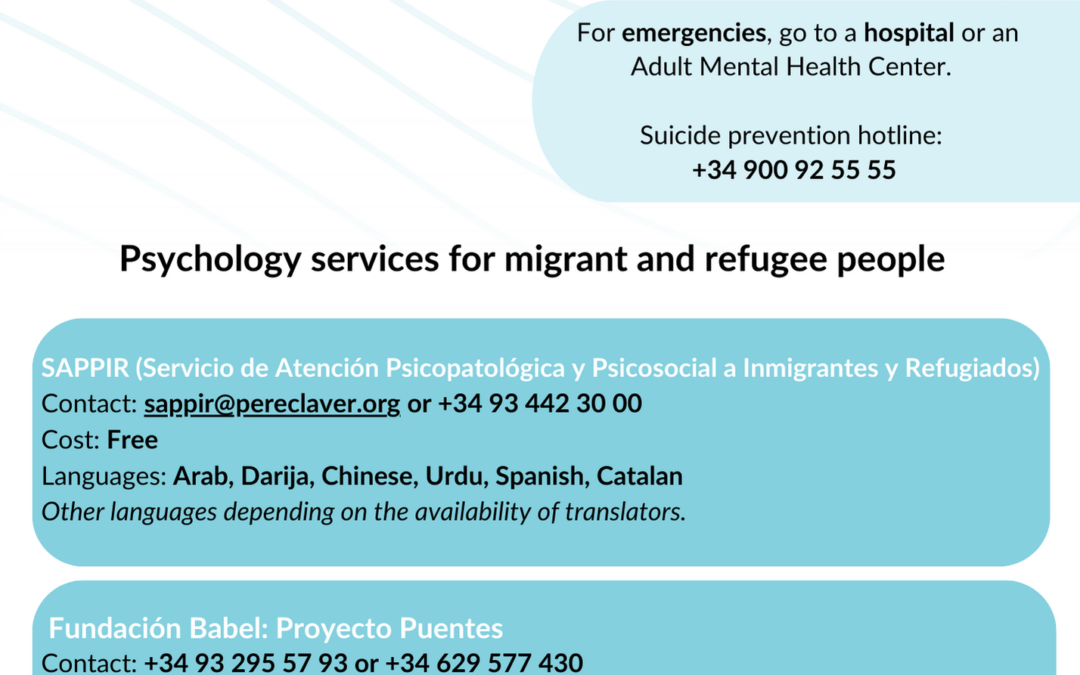Every year, millions of people around the world leave their homes for various different reasons and migrate to another country: taking such a decision can have a strong psychological impact. Those that travel along dangerous migratory routes tend to be those most affected, as they are vulnerable to violence and exploitation. On World Mental Health Day, we want to shine a light on the importance of catering for and supporting migrants and refugees with, not only their safety, but also their mental health.
Experiencing the trauma of leaving your home country, staying in a refugee camp for an indeterminate amount of time, the bureaucracy of applying for asylum and finally the mental work required to adjust to a new country and culture can be just some of the potential traumas and difficulties a migrant may face. According to the World Health Organisation, the prevalence of depression, PTSD, and anxiety is proportionally higher in refugee populations. Furthermore, the barriers to social integration in the host country, such as potential racism and xenophobia, can exacerbate pre-existing mental health problems.
Source: Stock Image
Migratory grief and the barriers to mental health care
Dr. Eduardo Brik, from the organisation Terapias Sins Fronteras (Therapy without Borders), explains the concept of migratory grief as a specific form of depression where: “You think all day about your country of origin, about your family […] you spend all day remembering the past, what you experienced, etc. […] Complicated or chronic grief in migration can be a disturbance that lasts a lifetime if it is not resolved with therapy.” Indeed, Dr. Laura Kait, from the organisation UMBRAL, emphasised the different effects of migration on children: “When people who migrated as children become adults they then seek out mental health support because they realise that a hole has been left there, a grief that they have not been able to get out.”
An understanding of the very specific mental health conditions and needs of people with migration background should be one of the key elements of consideration when discussing integration. Yet, several barriers prevent them from accessing mental health services in their host countries. One such challenge is language: migrant or refugee people may not be able to speak the language of the host country, nor feel able to open up about sensitive topics in a language that is not familiar to them. Stigma surrounding the topic of mental health can also disincentive people from reaching out for help. Such stigma has been attributed to several possible factors, including different cultural attitudes towards mental health, discomfort discussing personal feelings with strangers, or even fear stemming from having lived in countries where freedom of expression is suppressed. Finally, since mental health services are not always free or affordable, financial barriers may also restrict access.
Source: The Guardian (2017) https://www.theguardian.com/world/2017/aug/31/germany-turns-refugees-into-mental-health-counsellors-for-their-peers
Migration and mental health in Spain
Additionally, both Dr. Brik and Dr. Kait pointed to the lack of resources in mental health care services in general. In Spain, there are only six mental health care professionals for every 100,000 children and teenagers. Mental health requires very specific support, including building trust between patient and health care professional over an extended period of time. In the case of migrant and refugee people who may have more complex and specific psychological needs, health care providers should also be trained to provide trauma-informed, culturally sensitive support. However, with a lack of staff and resources, this type of care is difficult to provide.
To overcome some of these barriers, the WHO recommends that host countries provide clear information on the mental health services that newcomers are entitled to, raise awareness in religious and cultural community centres, facilitate affordable mental health services, and provide support in various languages with help from specifically-trained interpreters.
Regarding language and cultural barriers, Dr. Brik emphasised the importance of transcultural therapy, explaining that a person’s problems can only be understood within their wider context, including the country and culture that they come from. He went on to say: “The person who arrives in a country makes a cultural effort much greater than the one who lives there. That is why in transculturality, which is the exchange between two cultures, we must ensure that the two cultures make mutual efforts to adapt.”
Source: Benpolyonline (undated) https://www.benpolyonline.edu.ng/adapting-to-a-new-culture-k.html
During the research phase of the INTEgreat project, health professionals in Catalonia concluded that access to mental health support in the public system was one of the biggest lacks and barriers for refugee and migrant people’s integration. At OCC, we developed a leaflet, which will soon also be available in an online format, which shares free (or low cost) mental health resources available in Barcelona, most of them specifically dedicated to migrant and refugee patients.
If you are seeking mental health support, please find some organisations that can help on this flyer in your language:





